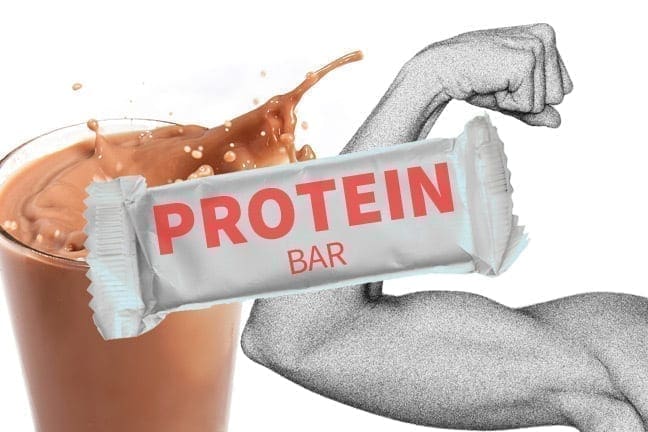These days, you’re no longer restricted to the meat, dairy and nut aisles to check protein off your grocery list. That’s because food manufacturers are packing protein into foods that often never had it naturally, from cereals and granola bars to chai tea—and boasting of its benefits.MORE: The Science of DigestionThe trend of food products with added soy or whey protein, which makes up 85 percent of the protein added to these foods, coincides with the popularity of high-protein diets as a way to shed excess pounds, points out Elisa Zied, a registered dietitian and author of “Nutrition At Your Fingertips.” But, we may not need the extra protein. In fact, it may cause more harm than good.“As Americans, we are kind of ‘over-proteined,’” says Kristin Kirkpatrick, R.D., YouBeauty’s Nutrition Expert and wellness manager for the Cleveland Clinic’s Lifestyle 180 program. In fact, Americans tend to take in twice the amount of protein they need already, according to the Physicians Committee for Responsible Medicine. “When you look at some of the healthiest societies in the world, they get a fraction of the protein we do,” adds Kirkpatrick. “Very rarely would someone need to add more than what they are getting in their regular diet.”Doctors and nutritionists have long recommended high-protein diets to aid in weight loss, but it wasn’t until recently that scientists mapped out just why protein is beneficial. According to research published in the journal, Cell, earlier this month, digested proteins set off a chain reaction in the digestive, nervous and circulatory systems that relay feelings of fullness hours after eating. Being satiated long after a meal cuts down on unnecessary snacking and helps you eat less.MORE: Can Certain Foods Speed Up Weight Loss?The Risks of Too Much ProteinProtein is one of the most fundamental building blocks in our body, needed for the formation of every cell in the human body, but too much of it can be dangerous to your health, notes Zied and Kirkpatrick.The kidneys are responsible for metabolizing protein waste products. Consume too much and the organs are forced to work overtime. Protein can also cause the body to excrete calcium, which can increase the risk of bone loss and osteoporosis. In an effort to up protein levels, some people increase their intake of meats that contain saturated fat, which raises blood cholesterol levels and consequently, the risk for heart disease, explains Zied.What’s more, high-protein diets usually come with the stipulation that you need to cut your carbohydrate intake so your body will burn its own fat for fuel instead of carbs, a metabolic state called ketosis. But ketosis can create ammonia as a byproduct, warns Kirkpatrick, which can be toxic to the body in the long run.Consuming too much protein can also have the complete opposite effect than intended, leading to weight gain if dieters aren’t careful to cut calories from other food sources, notes Zied.MORE: When Beauty Foods BackfireHow Much Protein Do You Really Need?In general, it’s recommended that 10 to 35 percent of your daily calories come from protein, according to the Centers for Disease Control and Prevention. Women aged 19 and older should aim to eat 46 grams of protein daily. To put that in perspective, that’s an eight-ounce container of yogurt (about 11 grams of protein); a three-ounce portion of meat (about 21 grams of protein); and one cup of dry beans (about 16 grams of protein). That’s already 48 grams of protein, so you can see how easy it is to have more than the recommend daily amount.That said, there are a few cases where getting in a small amount of extra protein can be beneficial. Eating more than the recommended dietary allowance helps support a growing fetus and milk production in pregnant and breastfeeding women, respectively, and it can also help repair a professional athlete’s muscle tissue after intense training.But unless you fall into one of these three categories, it’s best to stick with the traditional sources of protein: lean meat, fish, eggs, dairy, beans and nuts. Products advertising added protein are almost always processed foods that people should avoid anyway, recommends Kirkpatrick.QUIZ: What’s Your Eating Style?
© YouBeauty 2024




































